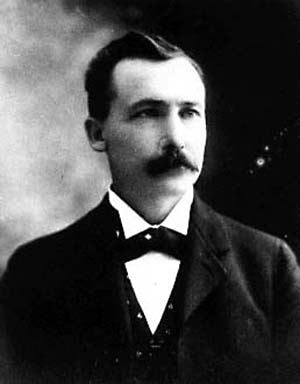Search | Image Archive | Reference | Communities | POV | Lesson Plans | Credits
 Canadian immigration
policy in the first decade of the century is associated with no one
individual more than Clifford Sifton.
Canadian immigration
policy in the first decade of the century is associated with no one
individual more than Clifford Sifton.
Like many of Manitoba's Úlite, Sifton was born in Upper Canada (Ontario) and came to Manitoba with his family as a youth. Trained as a lawyer, Sifton made his career first in provincial and later in federal politics. He was elected as a Liberal Member of the Legislative Assembly in 1888, and he served in the Greenway cabinet from 1891 to 1896 as Attorney General and Minster of Education. It was in the latter capacity that he played a central role in negotiating the Laurier-Greenway Compromise that partially resolved the contentious issue of religious schooling in the province. In 1896, Sifton went to Ottawa as a Member of Parliament, where he served as Minister of the Interior and Superintendent General of Indian Affairs. It is with this office that Sifton's name is synonymous.
As Minister of the Interior, Sifton steered the country into a vigorous immigration policy designed to people the west. Sifton was convinced of the economic potential of the west and the centrality of the west to the prosperity of Canada as a whole. He viewed immigration as a "national enterprise" to be undertaken in the same manner as the construction of the transcontinental railway. To this end, Sifton's department established immigration offices in the United States, Britain and several Central European countries in hopes of attracting experienced farmers.
Sifton wanted to build "a nation of good farmers." He felt that the west already had an oversupply of urban workers, and that to encourage the immigration of more city dwellers would only amplify the problems of urban poverty and unemployment and swell the slums of regional centres like Winnipeg. Accordingly, he instructed his agents to discourage the immigration of Italians, Blacks, Jews, Orientals and urban Englishmen who would not, he believed, succeed as farmers. Instead, the immigration agents sought candidates who it was felt would be more likely to endure hardships and remain on the farm. While many of immigrants came from traditional sources like Great Britain and the United States, this policy opened the door for others, and it was in this period that Canada saw a large influx of Eastern Europeans, including Ukrainians, Doukhobors and other groups from the Austrian and Russian Empires.
Sifton's policies were criticized. His said that the policies undermined the British character of the nation. Many of these new immigrant groups, with their different language, customs and habits of dress seemed slow or unwilling to assimilate to British-Canadian norms. One of the responses to the appearance of large non-British populations on the prairies was a rising nativism. It was to this backlash against "alien" immigration that Sifton's successor, Frank Oliver, was required to respond.
As the most prominent member of the federal Cabinet from the west, Sifton also acted on behalf of western interests. In 1905, he resigned cabinet over the terms of entry of Alberta and Saskatchewan into Confederation. In 1911, he joined several other prominent western politicians and broke with Laurier over the negotiation of a reciprocity treaty with the United States. Such a treaty, if signed would have established free trade with the United States, a move which Sifton felt would have ended the east-west trade that united Canada and replaced it with a north-south trade which would have made Canada increasingly a part of the United States.
Although Sifton left electoral politics in 1911, he remained an influential figure in Canadian politics. In 1891 he purchased the Manitoba Free Press, which he owned until his death in 1921. The Free Press was one of the most influential newspapers in Canada. Although Sifton and John Dafoe, the Free Press' formidable editor did not always agree, together they produced a newspaper whose editorial policies ensured that Western Canada's views were heard in Liberal circles across the country.
Page revised: 27 August 2009